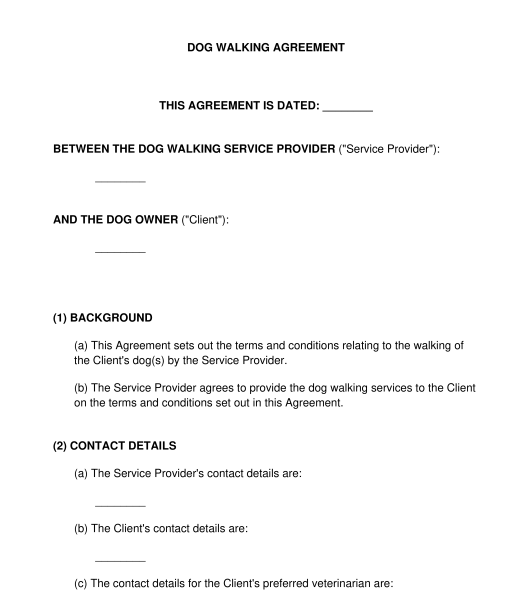 01/09/2025
01/09/2025

Answer a few questions and your document is created automatically.

Your document is ready! You will receive it in Word and PDF formats. You will be able to modify it.

 01/09/2025
01/09/2025
 Word and PDF
Word and PDF
 13 to 18 pages
13 to 18 pages



A Dog Walking Agreement is a contract that governs the provision of dog walking services. It is suitable for use by individuals or businesses that offer dog walking services, including those involved in pet care and animal welfare industries.
This agreement specifies the exact nature of the services, including the frequency and duration of walks, payment terms, details of the parties and the relevant dog(s), and what to do in case of emergency.
Using Dog Walking Agreements helps to prevent disputes by encouraging both parties to discuss and agree on key aspects of the service beforehand. Often, verbal or informal agreements ("on a handshake") may overlook crucial elements such as payment schedules, responsibility for pet supplies, or specifics about the care and handling of the dog. Addressing these issues upfront in a written agreement helps avoid potential legal disputes in the future.
For the provision of services other than dog walking services, the parties may consider using our standard Service Agreement.
This Dog Walking Agreement is intended for situations where the dog walker is hired as an independent contractor, as opposed to an employment contract where the service provider would be an employee.
Persons or entities using this document should consider the distinction between a contractor and an employee.
The distinction between an employee and a contractor is determined by various factors, and no single factor is decisive. Using this Dog Walking Agreement alone does not automatically categorize a dog walker as a contractor. Factors considered by courts include the ability to subcontract or delegate work, whether the worker supplies their own tools, the method of payment (time worked vs. outcome-based quote), the degree of control over how work is performed, and who is responsible for rectifying any mistakes in the work.
Misclassification of a worker as a contractor when they should be an employee can result in legal implications, including neglecting obligations such as superannuation and employee entitlements, with potential penalties.
Further guidance can be sought from the Australian Taxation Office, the Fair Work Ombudsman, or business.gov.au. The "Applicable Law" section below provides more information, and legal advice is recommended for further clarification.
This Dog Walking Agreement can be tailored for ongoing service arrangements or one-off engagements.
Including detailed descriptions of the services, criteria for service completion, payment release schedules, termination provisions, and steps to take in case of disagreement can help prevent disputes.
Dog walkers should provide a new Dog Walking Agreement for each new client. Each client should receive their own Dog Walking Agreement.
The Agreement becomes legally binding once signed and dated by both the dog walker (service provider) and the client. Both parties should retain a signed copy, either by signing two copies or photocopying a single signed agreement.
This Agreement has the option to include witnesses. Witnesses are not mandatory, but they can add an extra layer of authenticity to the document and can be helpful in the event of a dispute. Any witnesses should be independent adults who do not have a vested interest in the document.
The Fair Work Act 2009 and the Independent Contractors Act 2006 may provide relevant information regarding the classification of a worker as a contractor or an employee.
For services directly provided to the public, the Australian Consumer Law could be applicable.
State/territory legislation may also apply in some cases. For example, if the service provider is keeping multiple dogs at their property, then they might need to apply to the local council for a kennel licence. In addition, the service provider might need to consider local laws or regulations relating to matters such as having dogs off-lead, or walking them near native wildlife. Some relevant legislation includes:
General principles of contract law, as provided by the common law, will also apply to these agreements.
You fill out a form. The document is created before your eyes as you respond to the questions.
At the end, you receive it in Word and PDF formats. You can modify it and reuse it.
Dog Walking Agreement - sample template - Word and PDF
Country: Australia